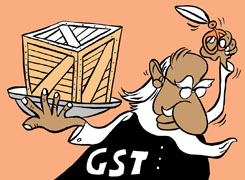GST Implications for Selling to Schools without GST Number
T S Khurana |536 Answers |Ask -Follow
Tax Expert - Answered on Oct 18, 2024
Since the last 21 years, he has also been providing expert advice on financial matters, including investments and diversification of funds, and wealth building in the long term to his clients.
He believes that investment in real estate is the safest way for better returns and wealth generation over a period of time.
A former chairman of the Chandigarh Chapter of Institute of Cost Accountants of India, T S Khurana has also served as member of its technical committee.... more

Dear Sir, I am running a proprietor firm registered under GST and trading in Office stationery. I have a query. When I supply items to registered gst clients, I add my profit amount to the cost price of the item and then add required gst amount to it. This is normal and clear to me. But, recently, I got to sell items to a school which does not have gst number and does not come under ambit of gst. So, I have to supply items with zero gst added to the final product price. In such a transaction, how I will calculate my profit margin and what will be tax implication for my firm. Pls advise. Thanks.
Your bill should be with GST as applicable. School is obliged to pay you inclusive of GST.
School is not under the ambit of GST means, any supplies from school to the children is not subject to GST.
How to adjust your profit is your internal matter & has noting to do with GST.
Most welcome for any further clarifications. Thanks.
You may like to see similar questions and answers below
Abhishek Shah | Answer |Ask -Follow
HR Expert - Answered on Feb 17, 2023
Tejas Chokshi | Answer |Ask -Follow
Tax Expert - Answered on Apr 18, 2023
Ramalingam Kalirajan |10870 Answers |Ask -Follow
Mutual Funds, Financial Planning Expert - Answered on May 10, 2024
Dr Dipankar Dutta |1837 Answers |Ask -Follow
Tech Careers and Skill Development Expert - Answered on Dec 05, 2025
Dr Shyam Jamalabad |108 Answers |Ask -Follow
Dentist - Answered on Dec 05, 2025
Dr Shyam Jamalabad |108 Answers |Ask -Follow
Dentist - Answered on Dec 05, 2025
Dr Shyam Jamalabad |108 Answers |Ask -Follow
Dentist - Answered on Dec 05, 2025
Dr Dipankar Dutta |1837 Answers |Ask -Follow
Tech Careers and Skill Development Expert - Answered on Dec 05, 2025
Ulhas Joshi |280 Answers |Ask -Follow
Mutual Fund Expert - Answered on Dec 05, 2025
Dr Dipankar Dutta |1837 Answers |Ask -Follow
Tech Careers and Skill Development Expert - Answered on Dec 04, 2025
Ravi Mittal |676 Answers |Ask -Follow
Dating, Relationships Expert - Answered on Dec 04, 2025
Anu Krishna |1745 Answers |Ask -Follow
Relationships Expert, Mind Coach - Answered on Dec 04, 2025
Anu Krishna |1745 Answers |Ask -Follow
Relationships Expert, Mind Coach - Answered on Dec 04, 2025



























